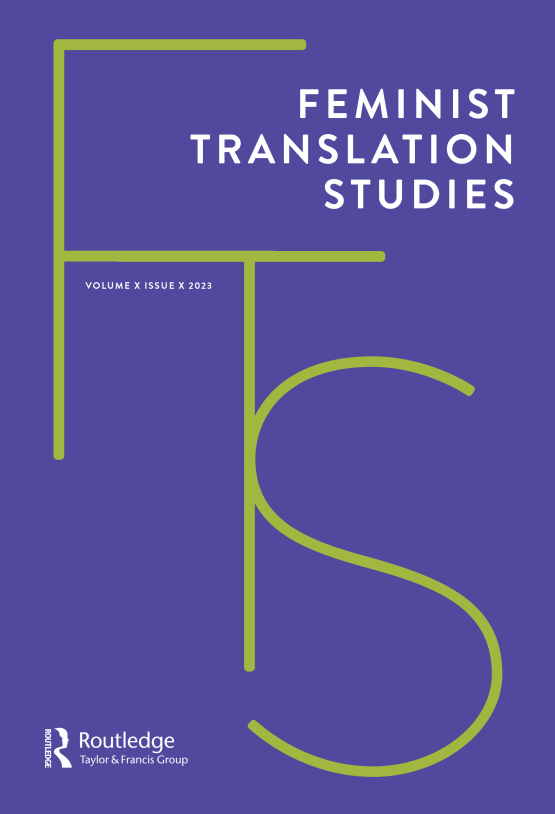Submit a Manuscript to the Journal
Feminist Translation Studies
For a Special Issue on
Local Feminisms in Transnational Translation
Abstract deadline
Manuscript deadline

Special Issue Editor(s)
Luise von Flotow,
University of Ottawa, Canada
lvonflotow@gmail.com
Hala Kamal,
Cairo University, Egypt
hala.kamal@cu.edu.eg
Sun Kyoung Yoon,
Hankuk University of Foreign Studies, Seoul, South Korea
ysksun@hufs.ac.kr
Local Feminisms in Transnational Translation
When we define ‘feminism’ as a broad “movement to end sexism, sexist exploitation and oppression” (hooks 2000, xii), we can see that there have been many different forms of feminism in the world, and over the ages. There is, indeed, a universal aspect to feminist movements –they are largely concerned with gender equality and women’s rights– but they are often local phenomena, deriving from and focused on a certain time and place and situation. As such, they do not always translate easily. Inspired by the compendium Provocations. A Transnational Reader in the History of Feminist Thought (Bordo, Alcalde and Rosenman, eds. 2015), which examines diverse manifestations of feminism over time –from ancient Greek poetry, suffragette speeches or Moroccan memoir, to excerpts from human rights law on domestic violence– this special issue of Feminist Translation Studies seeks to compile work on the translational aspects of such local and historical feminist activism and expression.
Taking feminist and gender-focused concepts, ideas and practices devised and developed in Anglo-American Eurozone regions since the 1960s as an example of local phenomena (with their own epistemology, philosophy, history and applications), we note that many of the concepts and terms that stem from this movement do not always translate well or easily into other languages and cultures (Niranjana 2007; Flotow and Scott 2016; Biermann 2017; Butler 2019; Slavova 2020). And yet, this particular feminist movement has, to a large extent, defined current feminisms around the world, often through international organizations such as the United Nations, where terms such as “gender-mainstreaming” have been coined for application worldwide (UN Women 2022).
To broaden our knowledge of other local feminist and gender-focused phenomena and their encounters with translation, this special issue welcomes research articles on theories and concepts, feminist activist projects, publications, creative works and events from around the world, and their fate, effects and impact in translation.
A number of questions to consider include, but are not limited, to the following:
- How have the local Anglo-American/Eurocentric feminisms fared when translated into other languages and cultures? What have these feminisms in translation come to mean in different cultural contexts? How has the Anglo-American focus on gender translated around the world?
- How can diverse forms of local feminisms be made available transnationally, via translation, an operation shaped by power differentials and asymmetries, for discussion and variegation of the dominance of the Anglo-American Eurozone position in the field? How have they been translated in global and transnational dialogues, conversations, and communications: South-to-South, South-to-North and North-to-South, as well as East-to-West and West-to East? To what effect?
- What translation problems do authors, thinkers, translators and/or publishers face when they translate local feminist work across cultures of the Global South or from the Global South to a language and cultural context of the Global North? How are these problems addressed, resolved?
This special issue seeks to explore local forms of feminism and the politics and practices of translation around them. Academic studies dealing with any text form —from literary to academic, technical or travel writing, to videogames, audiovisual media or social networking communications— are welcome.
References:
Biermann, Pieke. 2017. “Woke is Broke.”Was ist “sensible Sprache,” was soll uns die, und was hat die mit Űbersetzen zu tun? Toledo, March 17, n.p. https://www.toledo-programm.de/journale/
Bordo, Susan, M. Cristina Alcalde, and Ellen B. Rosenman (eds). 2015. Provocations: A Transnational Reader in the History of Feminist Thought. University of California Press.
Butler, Judith. 2019. “Gender in Translation: Beyond Monolingualism.” philoSOPHIA, 9: 1, 1-25.
Flotow, Luise von and Joan Scott. 2016. “Gender Studies and Translation: Entre braguette - connecting the transdisciplines.” In Border Crossings. Translation Studies and Other Disciplines, eds. Gambier, Yves and Luc van Doorslaer, John Benjamins, 349-373.
hooks, bell. 2000. Feminism is for Everybody. Passionate Politics. Pluto Press.
Niranjana, Tejaswini. 2007. “Feminism and Cultural Studies in Asia.” Interventions: International Journal of Postcolonial Studies, 9:2, 209-218.
Slavova, Kornelia. 2020. “Feminism in the post-communist world in/as translation.” In Handbook of Translation, Feminism and Gender, eds. Luise von Flotow and Hala Kamal, Routledge, 266-275.
UN Women. 2022. Handbook on gender mainstreaming for gender equality results. https://www.unwomen.org/en/digital-library/publications/2022/02/handbook-on-gender-mainstreaming-for-gender-equality-results
Submission Instructions
Abstracts of up to 500 words (excluding references) should be sent to the guest editors at lvonflotow@gmail.com, hala.kamal@cu.edu.eg![]() , ysksun@hufs.ac.kr The proposal should include your name, affiliation, title, abstract, key words and references.
, ysksun@hufs.ac.kr The proposal should include your name, affiliation, title, abstract, key words and references.
Decisions on abstracts will be announced by 15 May 2025. Selected contributors will be invited to submit full research articles for peer-review by 15 October 2025.
Full articles up to 7,000 words in length (including abstract, endnotes and references) should be submitted via the journal submissions platform. Please select "Special Issue (and title)" when submitting. For more information, please see the journal submission guidelines or email the journal at FeministTranslationStudies@gmail.com
Expected publication date: June 2026.

